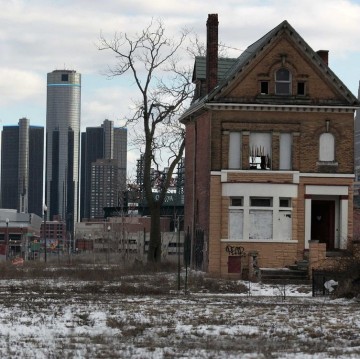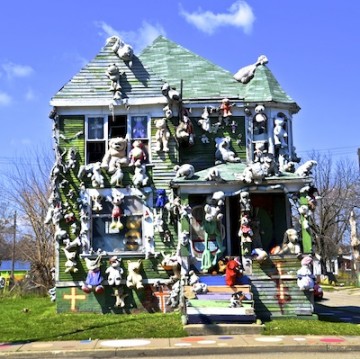Why Portland’s Urban Pioneers are Moving to Detroit
Monday, March 16, 2015
Annie Ellison, GoLocalPDX Reporter
The real hipsters of Portland have had it.
With the cost of living in Rose City steadily rising, some Portlanders are packing up and heading to Detroit in pursuit of the music and art scene Portland was known for in the 1990s.
 |
| An abandoned house in Detroit, MI overlooks the city's downtown. Photo: Harvard.edu |
“They’ve been buying houses in decent neighborhoods, move-in ready, for 20 grand,” Else said. “It started with a band member, and then he moved out the rest of his band, then they all got their own homes.”
'Portland isn't the same'
Multiple venues that once formed the backbone of Portland's music scene have now closed--Satyricon, Slabtown, The Blue Monk, Laughing Horse Books, Backspace, East End, Berbati’s, Langano, to name a few--and neighborhoods in Southeast where bands like Sleater-Kinney once practiced at full volume are now home to middle-class families.
"Whenever I talk to people from Portland, it's 'Portland isn’t the same anymore," Else said. According to the S&P/Case-Shiller Home Price Index, which measures the value of residential real estate, and calculates the average change in value of real estate year over year, Portland’s index rose 70 percent between 2000 and 2014.
Each artist has purchased a home in the range of $20,000, he said, and that although there is red tape involved in making modifications and additions, such as studio garages, it's rarely enforced.
One woman, a Portland musician who Else helped to close a deal in a central Detroit neighborhood, talked about painting her house a "crazy color."
"It's totally acceptable out here to do that, the neighbors are going to be happy they’re occupying the place," Else said. "A band can practice and no one is going to compain."
 |
| An art installation in Detroit as part of the Heidelberg Project features a home covered in stuffed animals. Photo: The Heidelberg Project |
One of the definitions of "urban pioneer" offered up by UrbanDictionary specifies someone "who buys a run-down house in an older sometimes depressed neighborhood of a city, remodels it, then sells it for a profit." While widely accepted as the first wave of gentrification, in the broader sense, an urban pioneer moves to an undeveloped and low-market area, bringing a wave of new business, art, and innovation that leads to urban renewal.
Fiber Connection Planned
Else said the Motor City is also beginning to attract tech startups. Billionaire Dan Gilbert is reportedly planning to build a fiber-optic internet connection--akin to Google Fiber--in downtown Detroit. The company, Rocket Fiber LLC, launched in 2014, and if completed would bring an internet connection 100 times faster than a broadband connection.
The formerly Portland-based multi-genre band Sold Only As Curio recently moved to Detroit, and are working on launching a non-profit based studio accessible to anyone with the drive to make music, which was not feasible in Portland.
Sold Only As Curio do not subscribe to the urban pioneer movement — rather, they are artists looking to make music and grow. Their motivation to relocate hinged on simple math.
“There’s room for us to grow here, not just to survive,” Sold Only As Curio wrote. “We are working class people with hopes of home ownership (which we could never have achieved in Portland) and we are musicians.”
Between January 2005 and December 2014, Portland’s S&P/Case-Shiller Home Price Index grew from 134 to 170, while during the same time period, Detroit’s dropped from 123 to 97.
The small but steady stream of Portlanders looking to Detroit for opportunity are not the only ones to been struck by the city's potential. Brooklyn’s Galapagos Art Space recently moved from its 10,000 square foot home to more than 600,000 square feet of space in multiple buildings throughout Detroit.
“To flourish, a well-functioning creative ecosystem needs three things in abundance; time, space and people,” wrote Galapagos Art Space Executive Director Robert Elmes. The once-orthodox view that creative communities could only thrive in major, preferably coastal metropolitan areas is changing, returning to the city where Motown was born.

